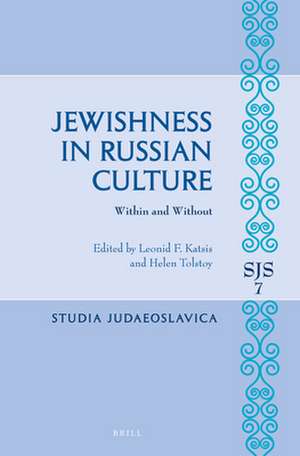Jewishness in Russian Culture: Within and Without: Studia Judaeoslavica, cartea 7
Editat de Leonid Katsis, Helen Tolstoyen Limba Engleză Hardback – 23 oct 2013
Preț: 630.45 lei
Preț vechi: 768.84 lei
-18% Nou
Puncte Express: 946
Preț estimativ în valută:
120.64€ • 131.45$ • 101.65£
120.64€ • 131.45$ • 101.65£
Carte indisponibilă temporar
Doresc să fiu notificat când acest titlu va fi disponibil:
Se trimite...
Preluare comenzi: 021 569.72.76
Specificații
ISBN-13: 9789004261617
ISBN-10: 9004261613
Pagini: 210
Dimensiuni: 155 x 235 x 18 mm
Greutate: 0.48 kg
Ediția:VIII, 210 Pp.
Editura: Brill
Colecția Brill
Seria Studia Judaeoslavica
ISBN-10: 9004261613
Pagini: 210
Dimensiuni: 155 x 235 x 18 mm
Greutate: 0.48 kg
Ediția:VIII, 210 Pp.
Editura: Brill
Colecția Brill
Seria Studia Judaeoslavica
Notă biografică
Leonid Katsis, PhD (1994), The Institute of Slavic Studies, Russian Academy of Sciences, is Professor at the Russian American Center for Bible and Jewish Studies at The Russian State University for the Humanities (Moscow). He received his Habilitate Doctorate in Russian Literature from the same institution in 2002. He has authored monographs on Vladimir Maijakovsky (2000, 2004), Jewish themes in Osip Mandelstam (2002), the Beilis trial (2006) among others, and edited with Prof. Helen Tolstoy the collective volume Zhabotinski i Rossiia (Stanford, 2013).
Helen Tolstoy is Professor Emerita of Hebrew University. She received an M.A. in English literature in Moscow and a Ph.D. in Russian literature at The Hebrew University, and has been teaching at her alma mater. She authored monographs on Chekhov (2003), Alexei Tolstoy (2006 and 2012), and Akim Volynsky (2012), and edited, with Leonid Katsis, the collective volume Zhabotinski i Rossiia (Stanford, 2013).
Helen Tolstoy is Professor Emerita of Hebrew University. She received an M.A. in English literature in Moscow and a Ph.D. in Russian literature at The Hebrew University, and has been teaching at her alma mater. She authored monographs on Chekhov (2003), Alexei Tolstoy (2006 and 2012), and Akim Volynsky (2012), and edited, with Leonid Katsis, the collective volume Zhabotinski i Rossiia (Stanford, 2013).
Cuprins
Introduction: Judaica Rossica – Rossica Judaica Leonid F. Katsis, Helen Tolstoy
PART ONE: JEWS SPEAK TO THE EMPIRE - THE EMPIRE CREATES ITS IMAGE OF THE JEW
1. The Jewish elite in the Russian Empire of the late 18th - early 19th centuries: Toward a rhetoric of self-presentation Olga Minkina
2. “Diabolic delight”: New light on the history of the Jewish theme in Russian Romanticism (the 1830-1840s) Mikhail Weisskopf
PART TWO: THE SILVER AGE AND THE JEWS
3. Akim Volynsky and His Jewish cycle Helen Tolstoy
4. The drama of faith and the national question in Russian-Jewish playwrights (1880 –1910) Galina Eliasberg
5. A philo-Semitic narrative in the anti-Semitic discourse: The case of Vyacheslav Ivanov Vladimir M. Paperni
PART THREE. THE RUSSIAN-JEWISH DIALOG IN REVOLUTION YEARS
6. Reflection through revolution: M.O. Gershenzon’s side in Correspondence from Two Corners Brian Horovitz
7. The discussions on Fedor Dostoevsky at the Moscow branch of the St.-Petersburg “Free Philosophic Association” as a Russian-Jewish dialogue Leonid F. Katsis
PART FOUR. THE TWENTIES: STRATEGIES OF SALVATION
8. Assimilation or cultural encounter? The picaresque in G. Bogrov’s Notes of a Jew and I. Ehrenburg’s The Stormy Life of Lazik Roitschwantz Olaf Terpitz
9. “…We must save our people” (On an unrealized project for a Russian-Jewish weekly in pre-war Paris) Vladimir Khazan
PART FIVE. OLD STEREOTYPES REEMERGE IN NEW GUISES
10. Anti-Semitism and the Vampire Theme Michael Odessky
11. The ‘Khazar’-‘Varangian’ dialogue in Dmitry Bykov’s ZHD: Some psychoanalytical observations Andrei Rogachevski
12. The darkness of Babylon: Russian-Jewish-Israeli experience in visionary journeys of Michail Gendelev Sergei Shargorodsky
PART ONE: JEWS SPEAK TO THE EMPIRE - THE EMPIRE CREATES ITS IMAGE OF THE JEW
1. The Jewish elite in the Russian Empire of the late 18th - early 19th centuries: Toward a rhetoric of self-presentation Olga Minkina
2. “Diabolic delight”: New light on the history of the Jewish theme in Russian Romanticism (the 1830-1840s) Mikhail Weisskopf
PART TWO: THE SILVER AGE AND THE JEWS
3. Akim Volynsky and His Jewish cycle Helen Tolstoy
4. The drama of faith and the national question in Russian-Jewish playwrights (1880 –1910) Galina Eliasberg
5. A philo-Semitic narrative in the anti-Semitic discourse: The case of Vyacheslav Ivanov Vladimir M. Paperni
PART THREE. THE RUSSIAN-JEWISH DIALOG IN REVOLUTION YEARS
6. Reflection through revolution: M.O. Gershenzon’s side in Correspondence from Two Corners Brian Horovitz
7. The discussions on Fedor Dostoevsky at the Moscow branch of the St.-Petersburg “Free Philosophic Association” as a Russian-Jewish dialogue Leonid F. Katsis
PART FOUR. THE TWENTIES: STRATEGIES OF SALVATION
8. Assimilation or cultural encounter? The picaresque in G. Bogrov’s Notes of a Jew and I. Ehrenburg’s The Stormy Life of Lazik Roitschwantz Olaf Terpitz
9. “…We must save our people” (On an unrealized project for a Russian-Jewish weekly in pre-war Paris) Vladimir Khazan
PART FIVE. OLD STEREOTYPES REEMERGE IN NEW GUISES
10. Anti-Semitism and the Vampire Theme Michael Odessky
11. The ‘Khazar’-‘Varangian’ dialogue in Dmitry Bykov’s ZHD: Some psychoanalytical observations Andrei Rogachevski
12. The darkness of Babylon: Russian-Jewish-Israeli experience in visionary journeys of Michail Gendelev Sergei Shargorodsky











